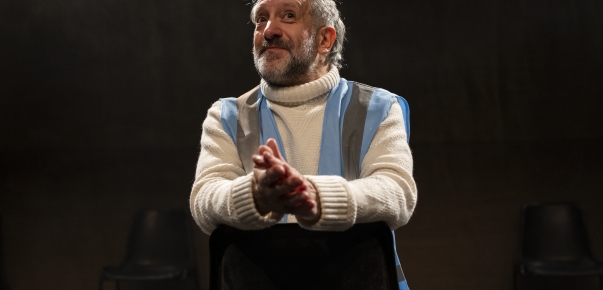Notes from the Writer and Director of Arabian Nights
20 Nov 2023

"My earliest childhood memories of Christmas theatre are of nativity plays I was in.
Aged 7, I lobbied for the role of the Angel Gabriel and my naive teacher made the mistake of giving it to me. I was thrilled at the outfit (a white and gold robe I found in my grandma's old-clothes box) but appalled to discover that my best friend was playing Zachariah and I had to strike her dumb (what kind of Christmas sadism is that? I suppose it was the late 80s).
I had my first realisation that I could never be an actor, when I couldn't steel myself to play this traumatic scene. The next year I was downgraded to one of twenty-five 'narrators'. Showbiz is tough.
I also got taken to a Christmas ballet as a small child, to see The Nutcracker. It was totally delightful. It was particularly delightful when four ballerinas were doing a parasol dance and one of them tripped and put her foot straight through her prop. I'm sure it was grim for the poor dancer, but I thought it was hilarious, and magical too - real life with all its pratfalls burst into this glossy, enchanted world for a second, and reminded us that it was all just people pretending, and if they could do it then any of us could do it too.

I think all Christmas plays are about finding a tiny spark of light in the darkness, and following it. This is true of The Nutcracker and A Christmas Carol and Narnia and any of the classics - you need a chilling, wintry world and a message of hope that leads you into spring.
This is why I love Sonali's version so much. Her story is about people joining together, and it's one where everyone can make a difference, regardless of who they are.
So I hope that audiences will be spooked by the scary bits and ache at the sad bits, warm themselves on the family love and the friendships, be transported by the stories and inspired by their message, and I hope they will follow their own imaginative roads and dream up new ideas of what is possible.
I think stories endure because you feel an affinity with the characters, or you want to know what happens next, or they surprise you. The stories that make up the Arabian Nights have a bit of all of these.
In the original, just as in our version, you meet confused but brave adventurers, wise talking horses, independently minded princesses, and some really striking monsters. There are quick-thinking, resourceful heroes from ordinary families, put-upon viziers, unreliable kings and battles of wits.
Additionally in the original (there are way too many stories to condense into a night at the theatre) you have trapped genies, clockwork animals, talking trees, shipwrecks and all kinds of other excitements. So as soon as you've got your head around one piece of drama or met one new person, a new one will be along to fill your brain with interest and excitement. I think these stories endure because they're witty, and both cynical and hopeful about people, and especially because - like Scheherazade - their invention is never-ending."
Blanche McIntyre, Director of Arabian Nights


Schere and Dina are two sisters who live in a place ruled by a terrible, despotic king. His first wife left him months ago, and he’s been dealing with his heartbreak with unusual cruelty - marrying a different woman every night and throwing them in the dungeon in the morning.
When the sisters’ neighbour is targeted by the king, Schere decides she’s had enough. She will use the power of the stories passed down to them by their mum to distract and captivate the king. In this way she’ll save all the women of the kingdom – like a total hero.
The character of Scheherezade has always gripped my imagination – this brave, resourceful woman who uses the power of storytelling to end a despotic regime. She’s an inspirational figure who’s stood the test of time because every era has had and has needed their own Scheherazade. This is an Arabian Nights for modern times, eschewing orientalism and instead centring the formidable women at the heart of this story.
Our Arabian Nights celebrates the resilience and resourcefulness of a long-suffering community as well as the power and possibility of collective action. The play is a love letter to our siblings – those related to us by blood and those who are our chosen family. The ones who build us up when we get knocked down, dry our tears, share our laughter, and always have our backs.
This is a festive show with a difference, with sparkle, wonder, hope and lots of gags and silliness thrown in for good measure. There are breath taking puppets, ridiculously catchy songs, and bold, funny, ingenious characters you rarely see on the British stage. This is a big, bold show, full of heart and a belief in the power of ordinary people to be extraordinary when working together.Sonali Bhattacharyya, Writer of Arabian Nights


